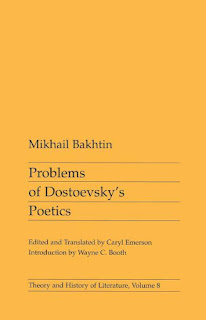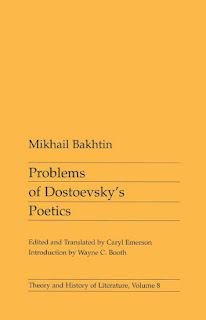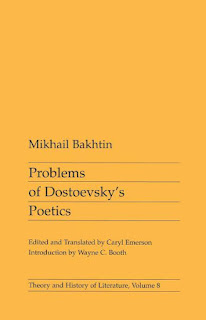Summary of Chapter 5: Discourse in Dostoevsky, part 1: Types of Prose Discourse. Discourse in Dostoevsky
This part of a four-part chapter is simply massive in terms of its theoretical content. Most importantly, Bakhtin lays out a three-part outline of different kinds of discourse (with multiple subtypes within the three). This is discussed throughout before being summarized in outline form on page 199 (it would have been easier to follow if the outline had appeared first). The three kinds are:
1) “Direct unmediated discourse directed exclusively toward its referential object”
2) “Objectified discourse (discourse of a represented person)”
3) “Discourse with an orientation toward someone else's discourse (double-voiced discourse)”
The third has three subcategories, and the list appears to be a more elaborated version of the 5-part list from “Discourse in the Novel.”
As he goes through this outline, numerous key concepts are elucidated. One is metalinguistics, Bakhtin’s project for a linguistics that goes beyond the textual limits of his day, to understand “discourse as concrete lived reality” (181). He talks about things like the speech characterizations of characters, to what extent these characters become more distinguished in speech, etc. from the voice of the author, which means they are more objectified (elsewhere he has called this “stylized,” though perhaps that means objectified with the voice of some particular group in society). (On second thought these might just be differing translations of the same word in Russian).
He brings up criticisms that have made of Dostoevsky, that his characters speak the same way he does (there is less “speech characterization); Bakhtin’s response is that this makes Dostoevsky less objectifying, and thus more dialogical, than other authors. This "speech characterization" I have seen, for instance, used to caricature passengers in (certain) taxi memoirs, and it distances and objectifies the voice and character of the passenger from that of the driver/narrator (though this is sometimes perhaps not itself so an intent at monologicality or orchestration, but rather shows a lack of ability or competence of the driver/author to represent or speak for (re-voice) the passenger). Also this seems a good place for a nod to Jack Vance, whose characters who all speak in the same stilted, witty manner as the author.
Dialogic relationships are the subject matter of metalinguistics; as Bakhtin is pointing out, these can also be found within texts, not just outside of texts. He gives examples of various "judgments," (statements), and how they can be or not be in dialogical relationships; this is a key point where his relationship to Volosinov and to Foucault can be elucidated. There seem to be at least four aspects of these dialogical relationships: they must be 1) discursive [they are not relationships per se, but relationships in discourse); 2) embodied (they are not just potential linguistic or articulatory positions, but they have to actually be taken and voiced; 3) they require a logical connection to a referential object; and 4) as utterance in discourse they need to receive an author [or subject position they are voiced by or attributed to]; this could be a real author (as in a speaker or writer of the utterance), or one to whom they are being attributed (such as a character in a story or in double-voiced speech) . [Presumably two judgments being expressed by the same character could be dialogic if the character is shifting positions in an internal debate. Anyway this whole approach seems contrary to Foucault's in the Archaeology of Knowledge.]
An example of a judgment: "Life is good." "Life is good." This is the same judgment repeated twice: the two are separate "verbal embodiments" [utterances] of the same judgment, and can also be placed into dialogic relation (e.g. as two characters agreeing].
The issue of the objectification of another's speech comes up, and this is explored through the different forms this takes in the different discourse types. He also discusses all these types as historical phenomena, making remarks about "epochs" (Classicism, Romanticism) in which different discursive possibilities were available to authors. Bakhtin's point is that the modernist idea of “access to one's own personal ‘ultimate’ word” (202) is a historical condition – in some epochs there is permitted "the ultimate semantic authority of the creator to be expressed without mediation in direct, unrefracted, unconditional authorial discourse" which presumably means modernism (Whitman comes to mind in this regard, as a representative of prose invading poetry). In other epochs, dominated by stylization, the author must speak through the words of others (he calls this “refraction”). However, the fact that Bakhtin's words above sound pertinent today – despite our prose and freedom from stylistic conformity, two aspects that Bakhtin sees as crucial for the modern authorial subject – indicates that for other reasons the independence of the author has become questioned, or culturally fraught as a concept; thus refraction seems more fitting than Bakhtin apparently felt it was (cf. all the communication done through “sharing” and “liking” today). Which leads to a second question: I think Bakhtin is setting up the concept of independent authorial discourse as a historical phenomenon here; this same authorial discourse is what he is in fact critical of, and wants to fight or undermine with polyphony. Yet if this sense of authorial independence has been weakened, is this a result of the polyphony Bakhtin celebrated? Or by something else, meaning the power of the author is less serious of a problem than he presumed?
Without naming them as such, he also discusses the concepts of citationality and orchestration.

















